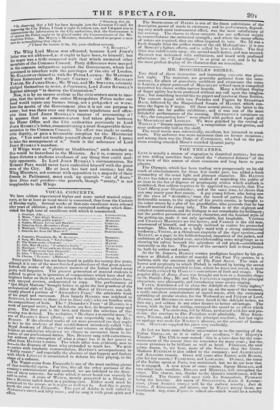VOCAL CONCERTS.
We have seldom experienced higher and more varied musical enjoy- ment, as far at least as vocal music is concerned, than from the Concert of Monday night. Several works of first-rate excellence were reheard after years of oblivion ; and the scheme contained nothing which dimi. tallied the high tone of excellence with which it commenced.
1. Overture, Joko L1NDPAINTER. 2. Motet, " Qui dill& Mariam " STLYFANI.
3. Glee, "Come gentle zephyr" Iloast.sv.
4. Soaata,Mesers. LUCAS and IlowELL COKELLI. 5. Selection from Alexander's Feast HANDEL,
6. Madrigal, '' Millis. go take thy pleasure" WEVI.NES
7. serious, tee. from the Mass in C. BErrirovEN.
B. Concerto, Pianoforte, Mr. W. Ils:s:NF:TT BENNETT.
9. Song, Mr. HHAHAM. Total eclipse " HANDEL, 10. The Storm.scene, (Seasons) IlSyoN. 11. solo, Miss --AWES, " salutaris hustle" CHERUBIM.
LEY.
12. Madrigal, " What sail l, my dainty darling" HUR 13. The Wuger.sceue from Euryanthe WFHEIt. 14. Glee, " Where the bee sucks" JACKSON. 15. Chorus, "To arms," (MilhMOCid) STORACE.
STEFFANI'S Motet has not been beard in public for twenty-five years, although it is one of the most finished productions of that great master. Indeed, the works of the greatest masters of the Italian school seem pretty well forgotten. The present generation of musical students is suffered to grow up in ignorance of compositions which have shed the brightest lustre on their art, and formed the models whence others have, with unequal success, endeavoured to copy. The performance of " Qui diligit Mariam," brought before its again the lost grandeur of the ecclesiastical style of Italy. After the Motet of STEFFAN', was judi- ciously placed a portion of" Alexander's Feast," the admirable work of his pupil and successor. How largely HANDEL was indebted to STEFFAN', is known to those (but to those only) who are familiar with the compositions of both. The "Alexander's Feast" of IIANDEL is work of unequal merit ; but its defects are few, its beauties many and great. The first part is the best, and thence the selection of this evening was derived. The recitative, " He chose a mournful muse," is one of HANDEL'S finest efforts ; and was respectably sung by Mrs. BURNET. If the classical works of nit were presented (as they ought to be) to the students of that establishment mistakenly called "tie Royal Academy of Music," we should not witness so deplorable and helpless an exhibition whenever we chance to encounter them in the course of our professional duties. Mrs. BURNET sang with correctness, but without any conception of what a singer has it in her power to effect from HANDEL'S notes. The whole affair was, evidently. new to her—to the disgrace of those who pretended to teach her. We wish to notice with emphatic commendation, HATTON'S accompaniment to "Softly sweet ;" and especially the absence of that foppery and foolery with which LINDLEY is accustomed to deform his fine playing, in the shape of a cadence. The Wager-scene from Euryanthe is one of the most exciting pieces Of that wonderful opera. For this, like all the other portions of the evening's entertainment already noticed, we are indebted to the direc- tors of these concerts: for music which is never heard can scarcely be said to exist. A score of Wenea, merely preserved in a library, is like a RUBENS nailed down in a packing.case. Either work must be presented to the senses, or it might as well not be. And this is pretty much the case with Euryanthe. The part of Adolar is well suited to eHffectaweiNs's sweet and lofty tenor ; and Ile sang it with great spirit and The Storm-scene of HAYDN is one of the finest exhibitions of the descriptive power of music in existence; and its performance, depend- ing very much upon instrumental effect, was the most satisfactory of the evening. The chorus in these concerts has not sufficient weight to counterbalance the orchestral strength ; and where the massy effects of voices are required, they are often required in vain. No. 12 was a fresh draught from the golden stores of the old Madrigalians : it is one of Mocii.ev's lighter efforts, and is called by him a ballet. The first Glee was indifferently sung; the second much better, and was encored. BRAHAM was welcomed with enthusiasm, and heard with profound admiration : his " Total eclipse ," is as great as ever, and is by far the most perfect display of its character that we remember.


























 Previous page
Previous page